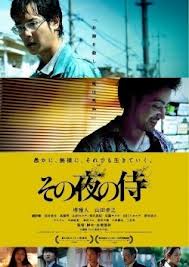 Although not part of
the London Film Festival's strand called 'Thrillers' (instead,
it's in 'First Features'), it would be hard to find a more
suspenseful and enthralling crime film than The Samurai That Night,
written and directed by Masaaki Akahori. The titular samurai is
Kenichi Nakamura, who owns a small machine shop, and who lost his
wife to a hit and run driver five years ago. The driver of the truck,
Kijima, was caught because of the guilt felt by his friend Kobayashi,
but now is out of prison, and looking for revenge, though he doesn't
realise Kobayashi's betrayal. He also doesn't realise Nakamura is
tailing him, though he does receive notes every morning, counting the
days until the fifth anniversary, the anonymous sender telling him
that he will kill both Kijima and himself.
Although not part of
the London Film Festival's strand called 'Thrillers' (instead,
it's in 'First Features'), it would be hard to find a more
suspenseful and enthralling crime film than The Samurai That Night,
written and directed by Masaaki Akahori. The titular samurai is
Kenichi Nakamura, who owns a small machine shop, and who lost his
wife to a hit and run driver five years ago. The driver of the truck,
Kijima, was caught because of the guilt felt by his friend Kobayashi,
but now is out of prison, and looking for revenge, though he doesn't
realise Kobayashi's betrayal. He also doesn't realise Nakamura is
tailing him, though he does receive notes every morning, counting the
days until the fifth anniversary, the anonymous sender telling him
that he will kill both Kijima and himself.
From that beginning
Akahori weaves the Japanese gangster movie into a penetrating look at
the shallowness of the society—something worthy of the masters of
the early postwar Japanese film. It's an interesting blend, as the
darkness that comes close to film noir blends into the flatness,
almost gray and dirty realism of working class Japan, but then bleeds
into the special empty neon brightness of the modern world. What
makes it work so well, however, is something that seems to carry over
from the film's origins; Akahori wrote it as a play and it bears a
considerable influence of theatre of the absurd. In the absurd,
characters re-enact daily rituals, which often are seen as neuroses,
as way of coping with the random indifference of life. What could be more ritualistic than the samurai, with his code of bushido, and heoric death. What death could be more indifferent than a hit and run? And Akahori's
Japan is a world of indifference.
People live in tight
spaces, they seem attached to electronic devices, they eat industrial
fast-food. The hapless Nakamura gorges himself on packaged custard
desserts; the last message he received from his wife on his answer
machine, just before she died, scolds him and orders him to stay away
from the custards. He plays the message over and over. Just like the
absurd at its best, scenes shift from comedy into pathos. At dinner
with a fellow teacher (the excellent Mitsuki Tanimura) with whom his
brother-in-law is trying to match-make, he pulls out a pair of his
wife's panties, and sniffs them. Then apologies politely.
'I have time, and I'm
bored to death,' says a hooker who watches TV as Nakamura, having
failed to perform the act he's paid form, furiously tries, and fails,
to open a bag of crisps. Watching him struggle, she returns to her
karioke. Earlier he's been told he doesn't look like a victim. 'I've
looked this way since I was born,' he replies.
Everyone seems alone,
and any attention is preferable to none: Kijima nearly kills Mr.
Hoshi, whom he suspects of betraying him, but Hoshi continues to tag
along with him, even as he victimises a young female a crossing
guard. Hoshi later explains, 'he's my friend'. Having abused the
girl, Kijima moves into her flat, eating her food and playing video
games, and virtually ignoring her as she says 'It's nice to have
someone here'.
 Kijima is the would-be
gangster, preying on the respectable, like Nakamura's brother-in-law,
whom he blackmails in return for keeping the threats secret.
Brilliantly played by Takayuki Yamada, he and his sidekicks Kobayashi
(Gou Ayano) and Hoshi (Tomorowo Yaguchi) might be playing scenes from
Waiting For Godot as they wander down the roads, or plot Kijima's
revenge. It builds to a sort of primal noirish apocalypse, a
show-down in the midst of a typhoon, then settles into an anti-heroic
anti-climax, in which the promise of a relationship drifts away, and
Nakamura returns to his custard, now baptising himself with it,
rather than eating it. There is no transformation in the universe of
the absurd, there is just the going on.
Kijima is the would-be
gangster, preying on the respectable, like Nakamura's brother-in-law,
whom he blackmails in return for keeping the threats secret.
Brilliantly played by Takayuki Yamada, he and his sidekicks Kobayashi
(Gou Ayano) and Hoshi (Tomorowo Yaguchi) might be playing scenes from
Waiting For Godot as they wander down the roads, or plot Kijima's
revenge. It builds to a sort of primal noirish apocalypse, a
show-down in the midst of a typhoon, then settles into an anti-heroic
anti-climax, in which the promise of a relationship drifts away, and
Nakamura returns to his custard, now baptising himself with it,
rather than eating it. There is no transformation in the universe of
the absurd, there is just the going on.

No comments :
Post a Comment